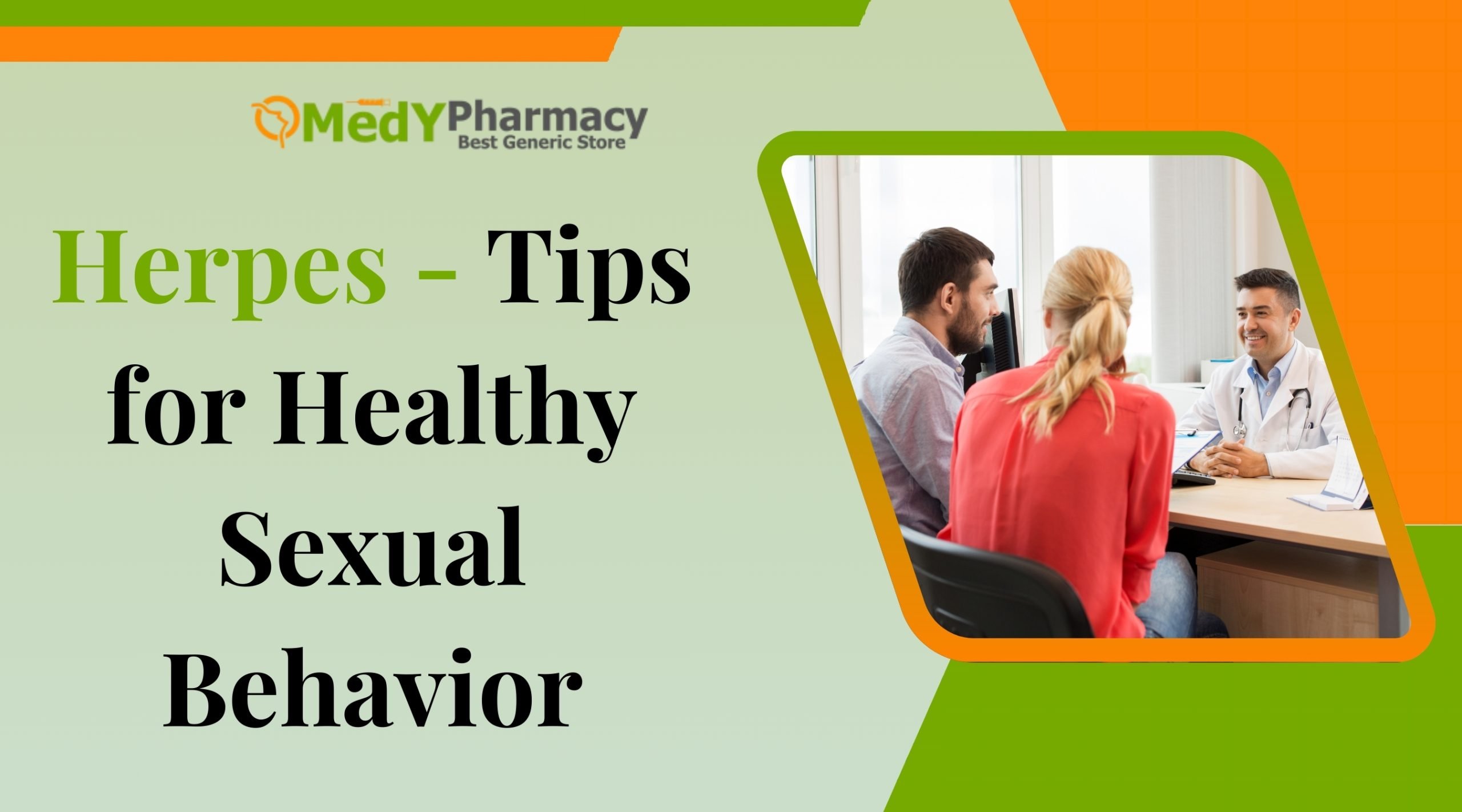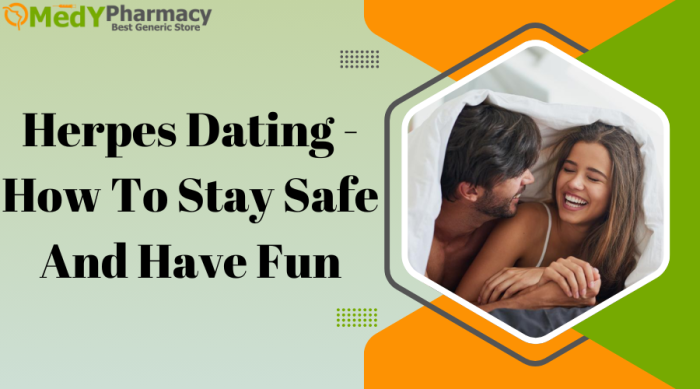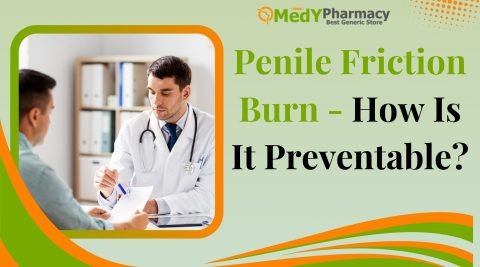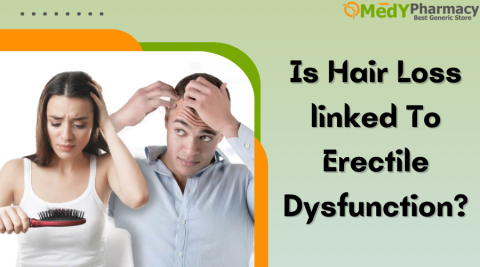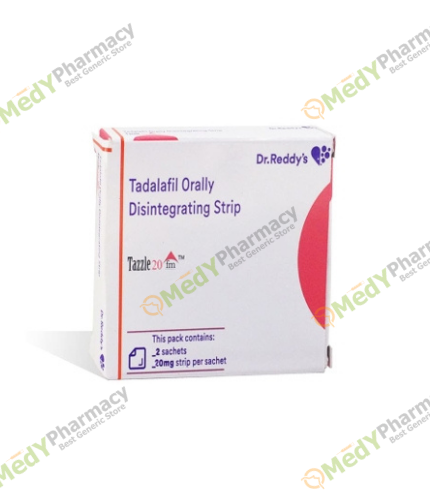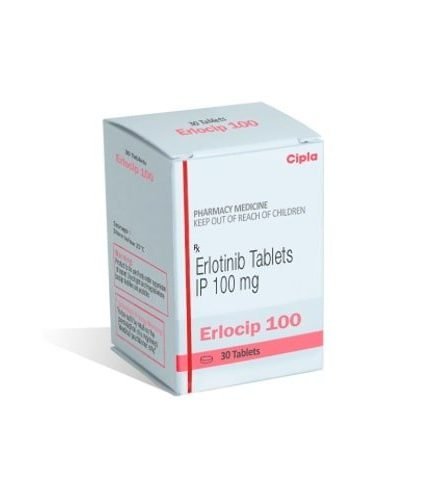Introduction:
A kind of infection called herpes is brought on by the herpes simplex virus. You may typically get blisters and uncomfortable spots around your mouth, genitalia, and other areas when you have this illness.
In this post, we’ll discuss how a genital herpes virus may impact your sexual life and how to overcome it so that you can continue to have good sexual relations even if you have the condition.
Genital herpes, which is caused by the herpes simplex virus 2 and affects sexual organs, will be the sole topic of this page. Generally speaking, genital herpes cannot be permanently cured.
However, you may stop its spread and even stop the symptoms from growing worse over time by implementing a few easy fixes and limits. During these periods, men who are having trouble getting an erection might use medications like sildenafil.
Even though your genital herpes may be more difficult than it was before your diagnosis, you can still have a satisfying sexual life. At this point, you need to exercise caution in both what you do and when.
When genital sores are present or you suspect a herpes breakout, stay away from certain sexual activities:
- Vaginal sex
- Anal sex
- Receiving oral sex
As long as your partner is aware of the possibility of getting herpes, it’s acceptable to have sex in between outbreaks. For instance, even if you are experiencing a flare-up of genital symptoms, you can still engage in oral sex with your spouse as long as you are not experiencing herpes sores in your mouth.
What Is Genital Herpes?
Blisters on your genitals are unpleasant and caused by this dangerous sexually transmitted infection (STI).
Anal, oral, and vaginal intercourse are the major ways that genital herpes spreads. However, someone with oral herpes can also infect you with genital herpes. This is a condition that develops when oral herpes moves from the mouth to the genitalia.
Herpes in the vaginal area cannot be cured. The virus remains in your body for the remainder of your life once it has entered. In addition to alleviating your symptoms, taking medicine can reduce the chance of the illness spreading. You may keep your partner from contracting genital herpes by using a condom, taking medication, and refraining from sexual activity during an outbreak.
Individuals may unintentionally spread the virus to others since the symptoms are often minor or undetectable.
Antiviral drugs can lessen the frequency and intensity of outbreaks and the risk of transmission, but there is no known treatment for genital herpes.
- Oral herpes, often known as cold sores, is mostly caused by HSV-1, however oral-genital contact can also result in genital herpes.
- The main cause of genital herpes, HSV-2 is usually spread during intercourse.
Although the virus may spread even in the absence of symptoms, outbreaks are when it is most infectious. Following an initial infection, the virus persists in the body and frequently rests in nerve cells. New epidemics may result from its later reactivation.
Sexually transmitted diseases include genital herpes, which is caused by the herpes simplex virus. The most typical signs of this condition are blisters and ulcers on the rectum, genitalia, and the areas around the reproductive organs.
You may experience symptoms including fever, headache, exhaustion, painful urination, and other symptoms within a day or two of contracting the virus. If it hinders a man’s ability to have a powerful erection, he might utilize medications like Fildena super active.
Describe Oral Herpes
HSV-1 is the main culprit behind oral herpes. HSV-1 is thought to infect between 57% and 80% of adult Americans.
Around the month or on the lips, it may result in blisters. Additionally, the cheeks or tongue may get blisters.
The virus that causes oral herpes is often acquired via nonsexual contact with saliva in childhood or early adulthood.
The mouth, lips, or tongue may first itch, burn, or tingle in someone who has an oral herpes outbreak. Anywhere on the skin or in these places, cold sores or tiny blisters may later appear.
The most prevalent type of oral herpes is known as fever blisters or cold sores, which are painful blisters filled with fluid that often occur around the mouth but can also arise in the neck or on the nose.
Direct contact with an infected person—typically by kissing—is the means of transmission, however sharing objects like towels, razors, or cutlery can also transmit the infection. Even in the absence of obvious sores, the virus can still propagate.
After infection, HSV stays in the body and may normally reside in nerve cells. Later on, when people are under stress, sick, or have weaker immune systems, it may reawaken and cause fresh outbreaks.
Oral herpes has no known cure, however, antiviral drugs can lessen outbreaks’ intensity and frequency as well as the chance of spreading the virus to other people.
Herpes and Sexual Life Together
Although you may not have any signs or sores, your spouse may have herpes. When engaging in anal, vaginal, or receiving sex, always wear a latex condom to assist avoid that. While there is no certainty that condoms will not cause infection, studies have indicated that they offer some protection. When treating cunnilingus and analogs, use a dental dam.
If not, apply your creativity. People can express themselves sexually in a variety of ways without making tongue-to-genital or genital-to-genital contact. Investigating them can improve your sexual life and compensate for absences from other activities due to genital herpes.
One almost risk-free option is to try reciprocal masturbation: In addition to physically masturbating each other, you might do it side by side, face to face, or back to back. After washing your hands with soap and warm water, ensure sure your hands are free of any damaged skin.
Additionally, make sure that no body fluids might accidentally be transferred, and never touch a herpes sore before touching your spouse. Using vibrators or dildos on each other is an option if you and your partner enjoy them. Be sure to wash the toy both before and after using it, and avoid sharing it.
Are Natural Home Remedies Effective For Treating Herpes?
You might be able to use home remedies to lessen the symptoms of a herpes flare-up, such as discomfort and inflammation.
Nevertheless, a treatment plan is still necessary. Numerous of them have only been validated by in-vitro research, which means that they were examined in lab settings rather than on living subjects. Given the complexity of the human body, a treatment that works well in a lab setting might not have the same impact on you.
It’s crucial to see a physician or other healthcare provider before using any alternative therapies. They can talk about interactions, side effects, and potential doses.
Home Remedies for Herpes
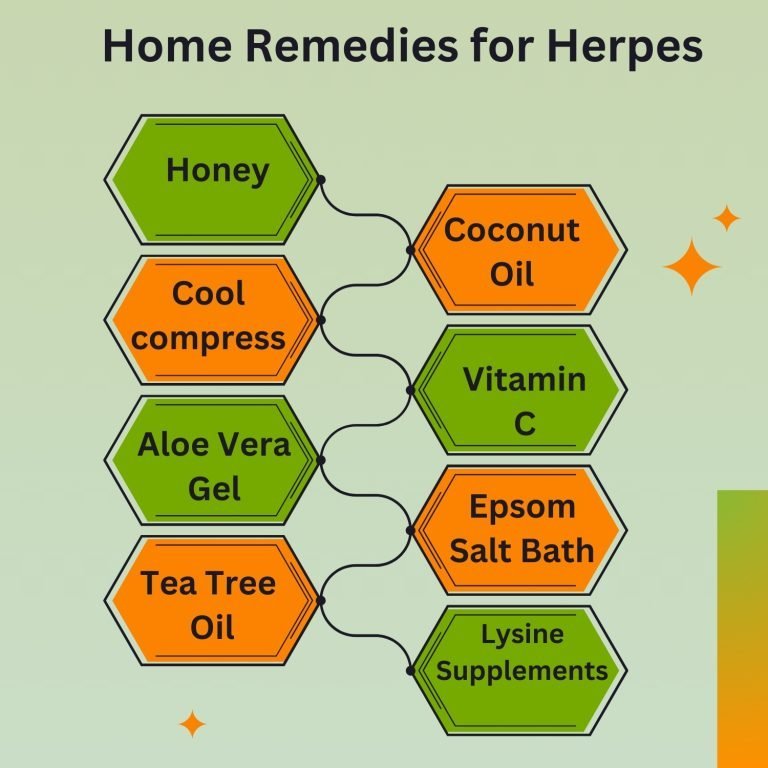
- Honey
Because of its calming, antiviral, and antibacterial qualities, honey has been used as a natural medicine for generations. Herpes symptoms may be somewhat alleviated by honey, especially raw or Manuka honey.
Honey has a reputation for accelerating wound healing. It helps shield the skin from outside microorganisms by forming a natural barrier, which helps stop subsequent infections. Given that herpes sores can occasionally get infected, honey’s antibacterial qualities may aid in the skin’s recovery and help stop more infections.
It is crucial to remember that honey does not treat the virus, even though it might be useful in controlling herpes symptoms. Antiviral drugs and other medical treatments can be enhanced by it, but they shouldn’t be substituted.
- Cool compress
In particular, the pain and swelling brought on by sores can be lessened with this easy yet powerful home cure for herpes outbreaks. To lessen inflammation, dull pain, and ease irritation, it lowers the temperature of the afflicted region.
The urge to touch or scratch the sores may arise when you’re feeling agitated. The region may feel less itchy after applying a cold compress, which lowers the risk of subsequent infections from scratching.
It’s advisable to stay away from cold treatment if you have sensitive skin or a condition like Raynaud’s illness or frostbite.
For the best benefits, a cold compress should be used in conjunction with other therapies, but it is an excellent non-invasive technique to reduce the discomfort associated with herpes outbreaks.
- Aloe Vera Gel
Aloe Vera gel is a well-liked natural treatment for several skin issues, including outbreaks of herpes. Because of its well-known anti-inflammatory, healing, and moisturizing qualities, it is particularly beneficial for easing the agony and accelerating the healing of herpes sores.
Aloe Vera has a reputation for encouraging skin renewal. Herpes sores may heal more quickly and leave no scars if you apply it to them.
Additional advantages can be obtained by mixing aloe Vera gel with other calming ingredients like honey or coconut oil. A tiny bit of coconut oil, for instance, can be added to aloe Vera gel to give it more hydration and antiviral properties.
This is a useful natural treatment for herpes symptoms, but it’s vital to keep in mind that it doesn’t treat the virus itself. Discussing antiviral drugs or other treatment alternatives with your healthcare physician is a smart idea if you get breakouts frequently or if your sores don’t go away after a few weeks.
- Tea Tree Oil
An effective essential oil with antiviral, antibacterial, and anti-inflammatory qualities is tea tree oil. For several ailments, such as acne, fungal infections, and herpes outbreaks, it is frequently utilized in skincare products. Tea tree oil is not a treatment for herpes, although it may help prolong and lessen the intensity of an outbreak.
Though it shouldn’t be used in place of the antiviral drugs that your doctor has recommended, tea tree oil can be a beneficial addition to medical therapy. A healthcare provider should be seen if you have severe or regular herpes outbreaks or if your sores don’t go away.
Tea tree oil can be a helpful component of your herpes treatment regimen, but for optimal effects, take it responsibly and in combination with other therapies.
- Coconut Oil
Another well-liked natural treatment for herpes symptoms is coconut oil, which has antiviral, anti-inflammatory, and moisturizing qualities. In traditional medicine, it has been used to treat a variety of skin disorders, and it can be very calming for herpes outbreaks.
To lessen inflammation, if you would rather use a compress, dab a little coconut oil onto a fresh washcloth and gently massage it over the afflicted region for ten to fifteen minutes.
Although it won’t treat herpes, coconut oil can be a fantastic adjuvant therapy. For antiviral drugs that can help manage the virus, it is advisable to speak with your healthcare professional if you experience breakouts frequently or if the sores are not healing adequately.
Herpes symptoms can be effectively managed with coconut oil, a mild, natural cure that works best when used in conjunction with other therapies like antiviral drugs.
- Vitamin C
The immune system needs vitamin C to be strengthened. Controlling the herpes simplex virus (HSV) and lowering breakout frequency can be achieved with a robust immune system. Herpes sores can cause swelling and discomfort, but vitamin C’s anti-inflammatory qualities can help them go away more quickly.
If your diet isn’t providing you with enough vitamin C, you can take supplements in the form of powder, pills, or capsules. For adults, the usual recommended daily dosage is between 75 and 90 mg. Some people choose to take greater dosages to treat herpes or during an outbreak, but it’s crucial to remember that exceeding the daily maximum of 2000 mg might have negative consequences, such as gastrointestinal problems unless a healthcare professional advises otherwise.
Although it helps boost your immune system, vitamin C cannot treat herpes. If you have recurrent outbreaks or if the sores get worse or don’t go away, you should talk to your doctor about taking antiviral drugs.
- Epsom Salt Bath
Herpes outbreak pain and discomfort can be lessened with an Epsom salt bath, a calming and helpful natural cure. Epsom salt is composed of magnesium sulfate, which has anti-inflammatory and muscle-relaxing qualities. It can ease inflamed, painful skin and aid in the healing process when dissolved in warm water.
Herpes sore irritation, burning, and itching might be lessened with Epsom salt baths. Inflamed skin can be soothed by the Epsom salt’s minerals and warm water, which will facilitate the healing process.
Although Epsom salt baths can be useful in treating herpes symptoms, it’s crucial to keep in mind that they don’t treat the condition itself. See a doctor about antiviral drugs if the breakouts are frequent or if the sores don’t go away. Though they shouldn’t be used in place of recommended therapies, Epsom salt baths may be a fantastic supplemental therapy for pain management.
- Lysine Supplements
An important component of protein synthesis and general health is lysine, a necessary amino acid. It is especially well-known for boosting immunity and aiding in the treatment of diseases like herpes. Particularly when taken as a supplement, lysine has been demonstrated to help lessen the frequency, intensity, and length of herpes outbreaks.
Your herpes management strategy may benefit from lysine supplementation, particularly if you want to lessen the frequency and intensity of outbreaks. For optimal effects, it should be used in conjunction with other therapies, such as antiviral drugs and lifestyle modifications.
Lysine has been shown in several trials to be effective in controlling herpes outbreaks. Participants who received lysine supplements in one trial reported less severe symptoms and fewer breakouts than those who took a placebo. To manage herpes, lysine should be used as a supportive therapy in conjunction with other antiviral drugs or treatments.
Why Does Herpes Occur?
Usually, direct contact can spread the herpes virus to another person if it affects the outside of the skin. This infection can also be spread by sharing items like towels, a sink, and other items.
Sexual contact, including intimate vaginal or anal intercourse, unprotected sex without a condom, sharing sex toys, or oral contact with an infected individual, is the primary way that sexual and genital herpes is communicated. If you have trouble getting a good erection, use Tadalafil.
Direct contact with the skin, mucous membranes, or body fluids of an infected individual can result in an HSV infection. This may take place during sexual activity, oral sex, or kissing.
The initial viral encounter is referred to as the primary infection, and it frequently results in observable symptoms. But in other situations, a person could not even be aware that they have the virus and might not even exhibit any symptoms.
Herpes can spread by asymptomatic shedding, which occurs when the virus is present on the skin or mucous membranes but does not produce symptoms, even in the absence of obvious blisters. This enables the virus to spread even when a person is unaware of their contagiousness.
Even when outbreaks are not occurring, close contact with an infected person can spread the virus since herpes is extremely infectious.
A Genital Herpes Drug Could Be the Best Option for you
For genital herpes, you may also think about using antiviral medication therapy to lessen the quantity of virus you shed. Daily suppressive medication may help prevent your spouse from contracting the virus, according to recent research.
It’s not always the greatest option for you to have therapy every day. If you don’t have many breakouts, you might relieve your mind by having some antiviral medications on hand in case symptoms flare up. Find out from your doctor if taking medicine for genital herpes would help you.
The possibility of skin irritation and breakouts due to sex friction is another factor to take into account. Try using a sexual lubricant that is based on water if that is an issue for you. You may find K-Y jelly and AstroGlide at a lot of pharmacies.
However, avoid using an oil-based lubricant as it might degrade latex. A lubricant that contains the spermicide nonoxynol-9 should also be avoided. Nonoxynol-9 may result in microscopic tears in mucosal membranes, which can facilitate the entry of viruses such as HIV and herpes.
Acquire the Ability to Identify Warning Indications
Being aware of early signs will help lower the chance of spreading the virus to a partner since once you begin to exhibit symptoms, you can spread it to others.
Before the sores show up, I have that kind of itchy, uncomfortable tingling sensation, and I also get pains in my legs, exhaustion, a low temperature, and soreness in my mouth.
You may only have these symptoms during the initial epidemic, but they may recur. Symptoms are typically milder than before they return.
How Can I Prevent Herpes From Spreading To Others?
If you are diagnosed with herpes, try not to panic. You can prevent it from spreading to your partners and other areas of your body in a few different ways.
When having vaginal, anal, or oral intercourse, always wear dental dams and condoms.
Consult your physician about taking daily herpes medication to reduce the risk of herpes transmission.
Avoid having intercourse during a herpes outbreak, even if you are using a condom. Wherever the condom does not cover, there may be sores.
Discover how to spot the warning symptoms of an epidemic and cease having sex as soon as you see them. A burning, stinging, or tingling sensation might be an indication that you are going to develop sores.
Wait till the scabs have healed and fallen off before having sex.
Avoid touching your herpes sores as this might infect other areas of your body or other individuals. Wash your hands immediately after handling a sore with soap and water.
Spitting on contact lenses might cause your oral herpes to spread to your eye.
Avoid kissing anybody if you have a cold sore in your mouth, especially infants, kids, and expectant mothers.
Before having sex, always disclose your herpes condition to your partners so that you can cooperate to stop its spread. Herpes is quite prevalent and doesn’t cause any health issues, yet telling someone you have an STD can be difficult. Therefore, make an effort not to feel overly anxious or ashamed about it.
The risk of contracting HIV is double for those with herpes. HIV-positive individuals who also have herpes are far more likely to infect their partners with the virus. Condom usage is therefore crucial for protecting both you and your companion.
Can Someone With Herpes Have a Sexual Life?
Yes, you can have sex with herpes, and if you take the proper care and awareness, it can be completely healthy.
It is a virus that persists throughout life. There are a few things to remember to be as safe as possible.
- Identify and Treat
First off, even while herpes doesn’t have to terminate your sexual life, it’s advisable to avoid sexual activity during the first outbreak.
Now is the moment to learn about your health, get medical advice and treatment for herpes, and have open discussions with your spouse.
Valacyclovir is the most often prescribed medication for the treatment of genital and oral herpes. However, the FDA has also authorized famciclovir and acyclovir as antiviral drugs.
Typically, during an outbreak, these medications are given two to three times a day for seven to ten days. Depending on the prescription’s purpose, dosages are changed.
See our page on the speed at which valacyclovir acts for expectations regarding prescription medication.
Herpes may be unexpected, so after an outbreak has been treated and cured, you can resume your sexual life. Most HSV carriers are unaware that they have the virus.
- Understand the Virus
The frequency of outbreaks of herpes might vary. Herpes breakouts can occur occasionally and recover in a week or two for some people, while others never get any symptoms.
A single HSV-1 outbreak and up to five HSV-2 recurrences annually are to be expected on average.
Knowing the distinctions between HSV-1 and HSV-2 is therefore essential. HSV-1 is more likely to cause cold sores on the lips and mouth, whereas HSV-2 is more likely to cause herpes sores on and around the genitalia.
Over two-thirds of individuals between the ages of 14 and 49 are infected with HSV-1, which is also much more prevalent. The majority of oral herpes cases are childhood infections caused by non-sexual salivary contact. At least 13 percent of persons in that age group are afflicted by HSV-2, despite it being less frequent.
It is believed that 90 percent of the world’s population is infected with one or both viruses.
- Communicate and Plan Ahead
For your relationship and your health, communication with your sexual partner is essential.
It is never pleasant to disclose that one has a sexually transmitted illness (STI), but it is the only responsible way to proceed.
Finally, get a consensus for reducing the danger of transmission. When there is an epidemic, avoid having sex. And for good reason.
Kissing is included in this for HSV-1 as cold sores are usually infectious. Read more about how to prevent the spread of HSV-1 during an outbreak in our guide on cold sores and kissing.
All things considered, even if a herpes virus might pose particular difficulties for a relationship, it is entirely feasible to have a fulfilling sexual life provided the appropriate measures are followed.
Additional Strategies to Prevent Infection Transmission
Here are a few more methods for both men and women who are still afflicted with herpes to get rid of the infection:
Oral intercourse should be avoided until the first symptoms, such as mouth sores and blisters, have subsided. As previously said, you must refrain from oral sex until that point. You can only engage in oral communication with your spouse once the mouth area has recovered from the infection’s symptoms.
Avoiding involvement with your spouse is the best way to experience the delights of personal activities and your sexual life. Instead, we advise you to pleasure yourself in front of the other person to start a sexual urge by using your imagination.
It’s not necessary to let your lover masturbate you; you can do it yourself. Keep in mind not to contact the infected person’s lips or genital organs when you are stimulating them. For people who use kamagra oral jelly for erectile dysfunction, this can also aid in achieving a firm and powerful erection.
It’s crucial to talk to your spouse and let them know about your illness before you become directly connected. Be loyal to who you are and the sexual connection that unites you. In the future, it will assist in eliminating any distrust that can further impact your sexual connection.
Not only should you be content with your sexual passion, but you should also demonstrate empathy and care for your partner. This demonstrates your love and care for your spouse even though you might not be able to engage in physical contact.
What Takes Place When a Herpes Outbreak Occurs?
The initial outbreak of herpes usually lasts between 2-4 weeks. The following are signs of an outbreak of herpes:
- Painful sores or tiny blisters around the mouth, rectum, or genitalia
- The fever
- Pains in the body
- Anxiety
- Increased lymph node size
Herpes outbreak recurrence is frequent and can occur many times annually. Recurrence symptoms, however, are often less severe and less persistent than those of the first epidemic.
Because you are more likely to transmit the illness to your partner, you should avoid having intercourse when there is an active herpes outbreak.
Tips for Prevention
The risk of getting or spreading herpes can be decreased by using the following tactics:
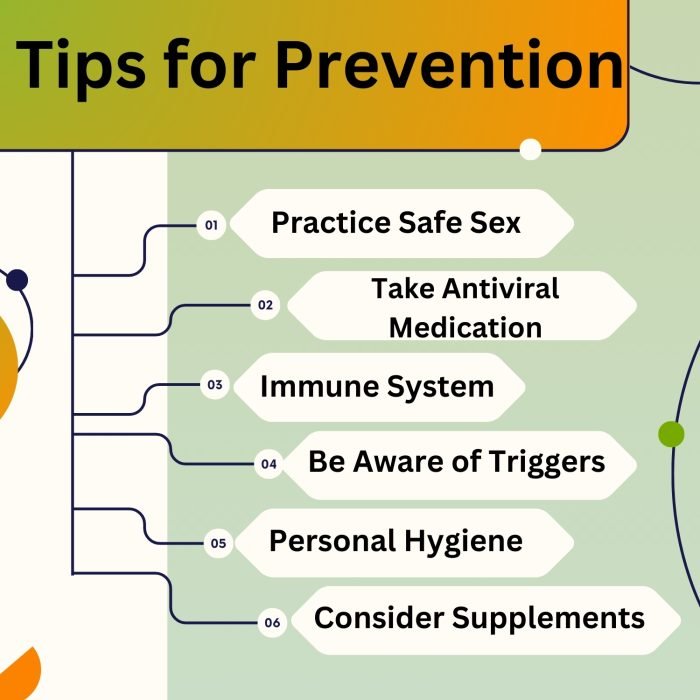
- Practice Safe Sex
Avoid sexual contact if you are experiencing outbreak symptoms or active sores. Even in the absence of symptoms, herpes can still spread, although it is most infectious when there are visible sores.
Interact with Partners: It’s critical to let any sexual partners know if you have herpes so they can make educated decisions regarding protection and stop the virus from spreading.
- Take Antiviral Medication
If outbreaks occur often, your doctor can recommend daily antiviral drugs. In addition to lowering the danger of spreading the virus to others, these drugs lessen the frequency and intensity of outbreaks.
Intermittent Therapy: To hasten recovery and lessen the chance of virus transmission, antiviral drugs can be administered during an outbreak for those who experience sporadic outbreaks.
- Immune System
Consume a well-rounded diet full of whole grains, fruits, and vegetables to promote general health.
Make sure you drink enough water each day to stay hydrated. Engage in regular exercise to boost immunity and circulation.
Make sleeping a priority: To aid in the body’s defense against infections, try to get 7 to 9 hours of good sleep every night. Control chronic conditions: HIV and diabetes can impair immunity, therefore controlling them is crucial.
- Be Aware of Triggers
The immune system can be weakened by illnesses like the flu or a cold, which makes an outbreak more likely. When you are ill, make an effort to look for yourself.
For some people, eruptions might be brought on by menstruation, pregnancy, or other hormonal changes.
Fatigue: An epidemic may result from physical weariness or sleep deprivation. Make certain that you receive enough sleep.
- Personal Hygiene
Through physical touch, herpes can spread to other bodily areas. Once you have touched a herpes sore, wash your hands well. Do not contact your eyes, since this can lead to severe infections.
If someone has an active herpes infection, avoid sharing eating utensils, lip balms, towels, or razors. This prevents the virus from spreading even in the absence of symptoms.
Use mild soap and water to gently cleanse the afflicted region during an epidemic. Use a fresh towel to gently pat dry the region, and stay away from tight garments that will aggravate it worse.
- Consider Supplements
Supplementing with lysine may help lessen the frequency and intensity of breakouts, as previously noted. Additionally, you may consume more lysine by consuming meals like meat, beans, and dairy products.
This vitamin, which strengthens the immune system, helps promote skin healing and stop breakouts. Supplements and foods like bell peppers, citrus fruits, and strawberries are good sources of vitamin C.
Zinc may help shorten outbreak length and is necessary for immune function. Foods like pumpkin seeds, beans, and nuts, or supplements containing zinc, may be helpful.
Stress, fatigue, sickness, skin friction, and sunlight can also cause recurrences of symptoms for certain people.
Eliminating these triggers can help lower the frequency of breakouts.
Telling Your Lover That You Have Herpes
Disclosing your herpes to your sexual partner might be challenging. Don’t worry, you shouldn’t feel guilty. Herpes infections are not caused by carelessness or poor hygiene, and they can affect anybody.
Even though discussing herpes with your partner might be difficult, the best approach to keep your sexual connection healthy is to be honest with them. To assist your partner feel more comfortable, be ready to give information and describe how you deal with the infection.
However, questioning and second-guessing your spouse can lead to needless tension and anxiety, which can ultimately harm your relationship more than the virus itself.
Consideration should also be given to where and when you announce your herpes diagnosis. Telling your spouse just before sex, for instance, is not a good idea since it might make them feel hurried and doesn’t give them enough time to decide how they want to continue. Setting aside time and space to discuss it might make you both feel secure and encouraged.
As you can see, we have explained in this post some of the restricted ways that people with herpes condition can enjoy sex and their sexual lives. Visit the Medypharmacy portal to purchase medications and treat ED or herpes.
Antiviral drug treatment can lessen breakouts, relieve your symptoms, and shield your sexual partners from infection. Your sexual health and relationships shouldn’t be impacted by having genital herpes.







